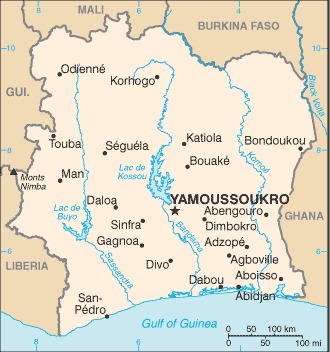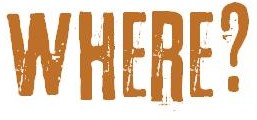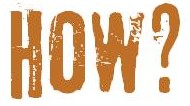
Ivory Coast The World Factbook 2021. Washington, DC: Central Intelligence Agency, 2021. https://www.cia.gov/the-world-factbook/

In November 2010, Cote d’Ivoire held a long-postponed election. Incumbent president Laurent Gbagbo faced challenger Alassane Ouattara. Ivorians’ votes were divided sharply across regional and ethnic lines, with Gbagbo getting votes from primarily the south and west regions and Ouattara the north. [1] Ultimately, Ouattara won this election that outside observers labeled free and fair, but Gbagbo refused to give up his office until he was arrested in May 2011. [2]
This standoff from November to May resulted in tremendous violence throughout the country as militias on both sides, armed by weapons flowing in from neighboring Liberia, launched attacks in a number of areas. It is estimated that over 3,000 people died in the conflict, hundreds of women and girls were raped, and several hundred thousand Ivorians fled to neighboring Liberia for refuge, a post-conflict country ill-equipped to handle the situation. [3]
Election-based violence is not isolated to Cote d’Ivoire. In Kenya’s presidential election of 2007, the major ethnic groups of Kikuyu, Luo, and Kalenjin fought over the election results. More than 1,300 people were killed in post-election riots and 600,000 fled from their homes. The violence threatened to become genocidal, with the ethnic groups battling for control of the government and the country’s resources. The conflict ended only through negotiations by Nelson Mandela and other world leaders. The International Criminal Court indicted four Kenyans for their roles in this tragedy. [4]
Similar incidents of election-based violence have occurred in Rwanda, Pakistan, East Timor, and Congo.
By May of 2011, Ouattara had successfully ousted Gbagbo and consolidated power. He then began to investigate and seek justice for the atrocities committed during the previous months of political violence. However, this justice was not impartial and sought to convict only pro-Gbagbo supporters who had committed crimes, even though atrocities had been committed on both sides. This one-sided ‘justice,’ which continued into the following years, created a corrupt judicial system that further divided the Ivorians. In addition, international actors during this time were very adamant in their condemnation of Gbagbo and his abuses but failed to condemn Ouattara’s abuses, once again reinforcing this failure of impartial accountability. [5]
During the next few years, under Ouattara’s rule, courthouses, prisons, and parliamentary elections were reestablished, much of which had been damaged in the previous year’s conflict. Ouattara also implemented a Disarmament, Demobilization, and Reintegration (DDR) program—an effort to disarm and reintegrate 60,000 youths who had fought on both sides during the 2011 conflict. While this program officially ended in 2015, much of this disarmament was not impartial and was one-sided, once again benefiting pro-Ouattara forces. [6]
Throughout 2011 and 2012, the Ivorian military, under Ouattara’s governance, committed numerous human rights violations while attempting to quell security threats. These abuses included torture, killings, rapes, and extortion. Over the past few years these violations have continued, but they have declined in number. However, sexual assault and government corruption remain.
One of the factors leading to violence is access and control of the area’s cacao and diamond resources. [7]
With the 2010-2011 conflict, hundreds of thousands of people were displaced both within the country and to neighboring countries. Upon returning back after the conflict had subsided, many people found their land had been taken over through illegal sales or hostile occupations. Progress is slow in resolving these conflicts, which has led to many disputes, most of them violent. In 2016 a rural land agency was established to speed up the implementation of a 1998 law that increased clarity regarding land ownership and titles. [8]
Former president Laurent Nbgagbo and former militia leader Charles Ble Goude were put on trial at the International Criminal Court in 2016, for crimes against humanity during the 2011 conflict. They were acquitted in 2019 due to insufficient evidence. The ICC also indicted Simone Gbagbo, the former first lady, but the Ivorian government denied transferring her to the Hague. Instead, Ivorian courts indicted her on the counts of crimes against humanity and war crimes. Human rights groups refused to participate in the trial due to its blatant biases and flaws. In 2015 she was sentenced to 20 years in prison. However, in 2018 President Ouattara declared amnesty for crimes related to the post-election crisis, thereby acquitting the first lady as well. [9]
Finally, following his election in 2011 and his reelection in 2015, President Outarra announced in March of 2020 that he would not run for a third term. [10]

Cote D’Ivoire is located in Western Africa and is bordered by Liberia, Guinea, Mali, Burkina Faso, and Ghana. [3]
![]()
The fighting and political stand-off were an aftermath of a long civil war that pitted northerners against southerners, Muslims against Christians, over issues of political control and access to Cote D’Ivoire’s resources and territory.
A second and persistent challenge in addition to resource control and power is the widespread trafficking of women and children. Women and girls are trafficked internally and transnationally for domestic servitude, restaurant labor, forced street vending, and sexual exploitation. Boys are often trafficked for agriculture, service labor, mining, construction, and in the fishing industry. [5]
The vast majority of victims are children. Children are trafficked into the country from Benin, Burkina Faso, Ghana, Mali, Mauritania, and Togo to work as domestic servants, farm laborers, and indentured servants, and for sexual exploitation. There are also reports of Malian boys working on farms and plantations in Cote d’Ivoire under conditions of indentured servitude.[6] Children have been trafficked out of Cote d’Ivoire to other countries in Africa as well as to Europe and the Middle East. Children are also trafficked from all parts of the country into Abidjan and other areas in the south for domestic service. National armed forces and rebel groups often recruit children for use in armed conflict, sometimes on a forced basis. Rebel forces actively recruit child soldiers from refugee camps and other areas in the western part of the country.

Human rights groups have charged that the Cote d’Ivoire government has done very little to decrease or eliminate trafficking. Cote d’Ivoire continually fails to provide evidence of increasing efforts to eliminate trafficking, particularly with regard to its law enforcement efforts and protection of sex trafficking victims. [7] Ivoirian law does not prohibit all forms of human trafficking, and Cote d’Ivoire has not ratified the 2000 United Nations Trafficking-In-Persons Protocol. [8]
Sexual activity is perceived as a private matter, making communities reluctant to act and intervene in cases of sexual exploitation. These attitudes make children more vulnerable to sexual exploitation. Myths such as the belief that HIV/AIDS can be cured through sex with a virgin,[9] technological advances such as the Internet which has facilitated child pornography, and sex tourism targeting children all add to children’s increasing vulnerability. Surveys indicated that 85% of victims of sex trafficking in Cote d’Ivoire are girls.[10]
Child victims of trafficking are exploited in the country’s agricultural, mining, fishing, and domestic service sectors. The country’s cities and farms provide ample opportunities for traffickers. The informal labor sectors are not regulated under existing labor laws. Domestic workers, most non-industrial farm laborers, and those who work in the country’s wide network of street shops and restaurants remain outside government protection. Girls ranging from 9 to 15 years old are often forced to work as household servants in Abidjan and elsewhere in the more prosperous south Cote d’Ivoire. [11]
Traffickers of local children are often relatives or friends of the victim’s parents. Traffickers sometimes promise parents that the children will learn a trade, but children often end up on the streets as vendors or as domestic servants. Due to the current global economic crisis, many parents are financially desperate and are hopeful that their own financial situations will improve as a result of what they expect will give their child a legitimate income.
Children are trafficked to Côte d’Ivoire for forced agricultural work. There are an estimated 15,000 Malian youth ages 15 to 18 who are enslaved in the Cote d’Ivoire, lured by smugglers who promise the youth and their parents high wages and training.[12] Instead, most do manual labor in cocoa plantations. Child agricultural workers are exposed to dangerous pesticides and other hazards in addition to conditions of near starvation, no access to education or health care, and slave labor.
Almost half of the world’s cocoa used in chocolate comes from Cote d’Ivoire,[13] which makes this African country the biggest producer of cocoa worldwide. Most of the laborers on cocoa plantations are between twelve and sixteen years old, although some are as young as nine. Children do not receive any payment for their labor. They are also often beaten when they don’t work or if they try to escape. Children are locked up at night, do not get sufficient nutrition and can work from 80 to 100 hours per week. It is unknown how many children are enslaved in Cote d’Ivoire. Some estimates state that approximately 15,000 child slaves work on cocoa, cotton, and coffee farms throughout the country. [14]
After much speculation, Ivory Coast President Alassane Ouattara has officially announced that he does not plan to run for a third term in the country’s upcoming election. This election, which will be held in October of 2020, will be seen as a major test of stability for the country after two civil wars this century. According to experts, the election looks highly unpredictable. Ouattara’s bitter rival, former president Laurent Gbagbo, could return after being acquitted of crimes against humanity at the International Criminal Court in The Hague, as could former president Henri Konan Bedie. [22]
Updated: World Without Genocide, April 2020.
Citations:
[1] https://www.hrw.org/world-report/2011/country-chapters/cote-divoire
[2] https://www.bbc.com/news/world-africa-11916590
[3] https://www.nytimes.com/2011/04/01/world/africa/01liberia.html
[4] https://www.aljazeera.com/indepth/features/2013/03/201333123153703492.html
[5] 2011 World Report, op. cit.
[6] https://www.hrw.org/world-report/2016/country-chapters/cote-divoire
[7] Ibid.
[8] https://www.hrw.org/world-report/2017/country-chapters/cote-divoire
[9] https://www.hrw.org/world-report/2020/country-chapters/cote-divoire
[10] https://www.theafricareport.com/24262/alassane-ouattara-pulls-out-of-the-2020-presidential-election/
[11] https://www.britannica.com/place/Cote-dIvoire
[12] https://www.state.gov/j/tip/rls/tiprpt/countries/2015/243421.htm
[13] http://gvnet.com/humantrafficking/CoteD’Ivoire.htm
[14] https://www.state.gov/j/tip/rls/tiprpt/countries/2015/243421.htm
[15] https://www.unodc.org/unodc/en/human-trafficking/what-is-human-trafficking.html
[16] https://www.ncbi.nlm.nih.gov/pubmed/25871812
[17] http://gvnet.com/humantrafficking/CoteD’Ivoire-2.htm
[18] https://www.state.gov/j/drl/rls/hrrpt/2005/61565.htm




